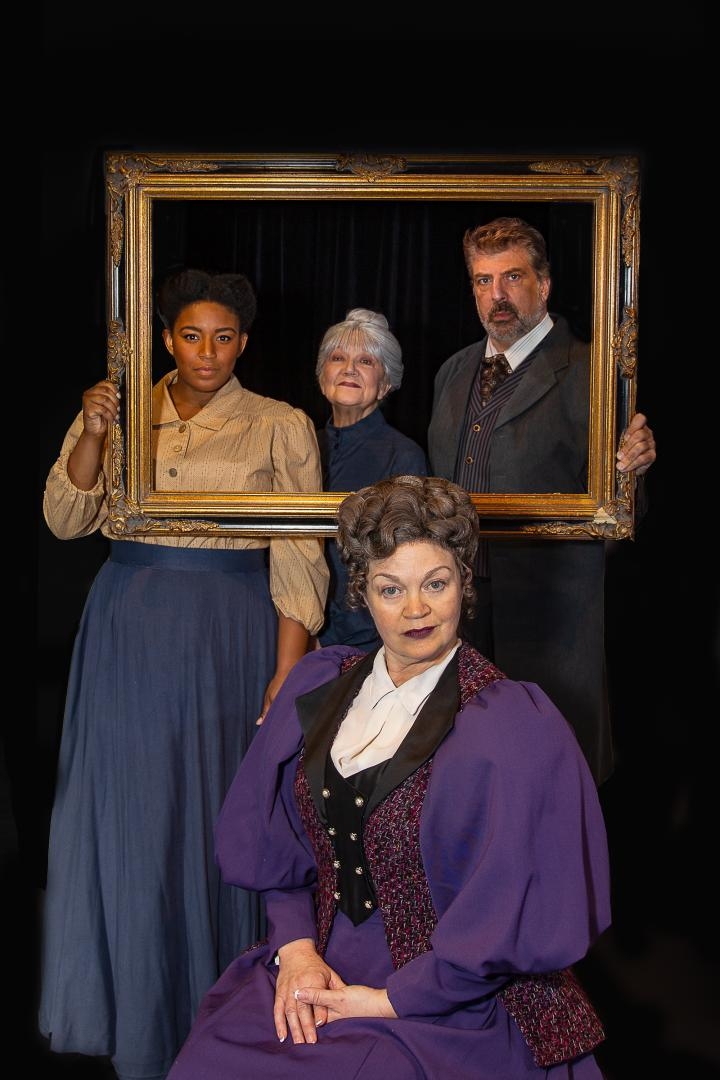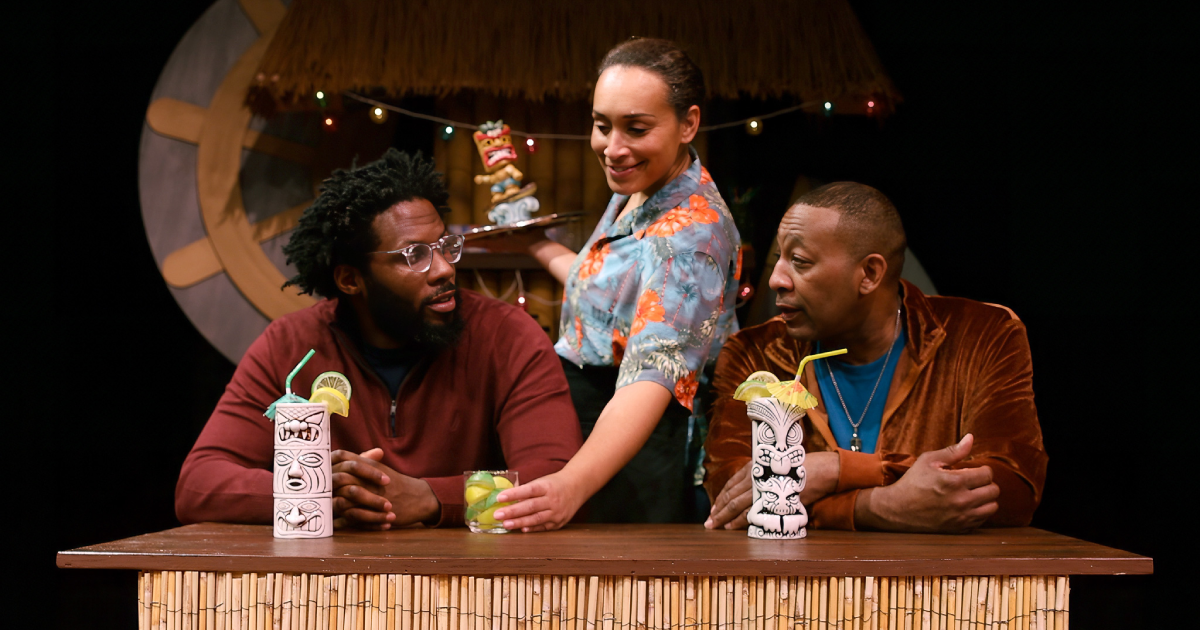Nora slammed the door on her husband and three children more than 140 years ago when she walked out of her married life in Henrik Ibsen’s proto-feminist masterpiece “A Doll’s House.” But now she’s back in Lucas Hnath’s critically-acclaimed and Tony Award-winning “A Doll’s House, Part 2” to answer and raise further questions in a tremendously moving yet remarkably unadorned production of the 2017 play at Farmers Alley Theatre in Kalamazoo.
The audacity of penning a sequel to Ibsen’s classic is admirable, even more so for its tremendous successes, and it was begging to be done, really. Whatever happened to Nora? At turns terrifically thoughtful, wickedly sharp, and funny, the play that originally came to life with Laurie Metcalf playing the central role boldly answers that question while also raising anew the very Victorian “Woman Question” in a way that makes contemporary audiences question themselves in perplexing and insightful ways.
In this four-person play of tightly crafted, mostly two-person scenes, Nora confronts her husband Torvald, her daughter Emmy, and Anne Marie, the woman who raised her as well as the three children she left behind 15 years before. Or rather, they confront her. In pursuit of her “best self,” she threw off the shackles of marriage and motherhood, making her needs more important than her children, to become a successful author of semi-autobiographical feminist novels that essentially call for an end to marriage. And they’re so wildly popular, they’ve inspired countless women to also up and leave their husbands and lives of quiet desperation.
One such woman was married to a judge who is threatening to literally imprison Nora for, though unbeknownst to her, not actually being divorced, essentially committing fraud for conducting business, signing contracts, taking lovers as a free agent though still legally Torvald’s property. So, Nora has returned, to ask Torvald to file for divorce. Still enslaved, still unapologetically critical of the systems of oppression that are still at play in her life, still a force to be reckoned with, still utterly vulnerable, she comes to discover the people she left behind are not by any means happy for her and the joyful life free of domestic shackles she pursued and successfully created against all odds.
To the contrary, in fact. In a flurry of clever anachronisms that force contemporary audiences to perceive history as a continuum, they swear at her freely as she espouses self-helpisms that, channelled through Elizabeth Terrell’s unforgettable performance make this powerful archetypal character come across as of her time, of our time, and yet utterly timeless. We see ourselves in her, feel our own difficult choices and consequences in the tremendous layers of emotion expressed on her face and through her bold breath and movements, both symbolic and deeply felt, sympathetic and yet extraordinarily complex. As envisioned by Hnath, Nora is a feminist anti-hero who’s not entirely sympathetic and has the potential to come off as overly stylized and cold; however, Terrell gives her warmth and life and simultaneously offers hopefulness and hopelessness in her largesse on the roller coaster of this seemingly never-ending loop in which we’re all, in many ways, still stuck.
That includes men and generations of women of differing classes, as captured by the other three characters who intermittently express their rage at Nora, who holds all their projections and never leaves. Until she does. But only at the bitter end, which does, indeed, always come again.
But she stays in the fight as this psychologically thrilling iteration of the action unfolds, with the hard-fought and brilliantly scripted yet utterly natural and recognizable arguments with husband Torvald, daughter Emmy, and Nanny Anne Marie. They each make a strong case for their wounds as caused by Nora, but here it’s clear that cultural inequality is to blame — and therefore hard choices and sacrifices have had to be made, meaning nobody, ultimately, wins.
Well, except for everyone who takes the opportunity to bear witness to this fantastic ensemble. Zoe Vonder Haar provides terrific comic relief as well as the crux of class conflict among women in her delightful and nuanced portrayal of Anne Marie; Arizsia Staton as Nora’s abandoned daughter Emmy presents as powerful a woman as her mother, though of different stripes.
In a showdown between the two who have never known each other, each stands her ground with hands on hips, Nora rising above her — like Torvald had physically condescended to her just moments before — as she insists Emmy feels the same way she did before Nora became enlightened that marriage is an “unnecessary process of self torture” that says “I own you.” But Emmy makes a pretty convincing argument for why she righteously longs to be possessed that is akin to being held, aka being loved.
Torvald, too, has been hurt by Nora’s absence, and, we feel it viscerally through Paul Stroili’s portrayal of this man who can’t help but mansplain and talk down to the woman he genuinely loves and misses. He’s wonderfully human and humorous, mad as hell at Nora not just for leaving, but for how she’s portrayed him in her “little books”, and caught up in a whirlwind in which two people desperate to communicate simply can’t hear each other. Though watching Terrell and Stroili valiantly try is so very satisfying and heartbreaking at once.
All the scene work unfolds in Dan Guyette’s sparsely dressed set that effectively represents a single high-ceilinged room that imprisons the characters in its austerity, lit simply by George Eric Perry. Costumes by Kathryn Wagner effectively evoke period and class, and allow the actors to move in ways both grand and subtle.
“A Doll’s House, Part 2” ultimately comes down to love, but in this complex world of truth-telling confrontations amid betrayal and deceit, it’s never quite that simple. What does it mean to live in matrimony? What does it truly require to be free, and can it ever be done? What does it mean to be alone and to sustain a life with others? How does one live authentically, regardless of the age in which one lives? They’re unanswerable questions, yet still well worth raising, and perhaps more deeply resonant now than ever.
Director D. Terry Williams gets it right from start to finish with “A Doll’s House, Part 2” at Farmers Alley, and takes the provocation inspired by a classic far beyond its potential as an open-ended intellectual exercise. Thanks largely to a cast that couldn’t be stronger or create more naturalness and ease, as well as inspired blocking infused with symbolism both subtle and profound, he goes for depth rather than surface-level style. The result is a play full of important ideas that come across on a felt-life level, making you fall in love with it even more than it makes you think.
A Doll’s House, Part 2
Farmers Alley Theatre
Nov. 2-18
farmersalleytheatre.com





